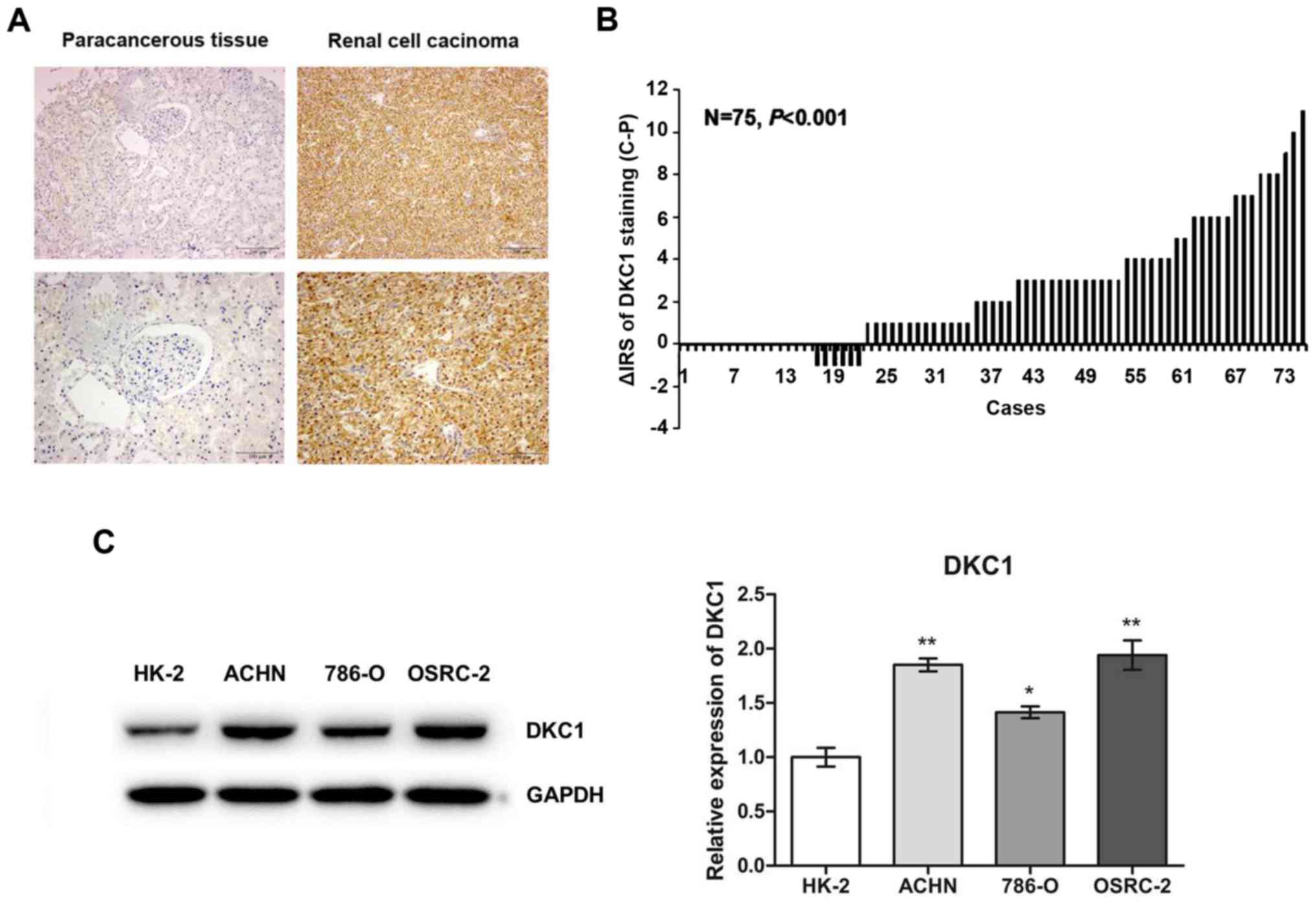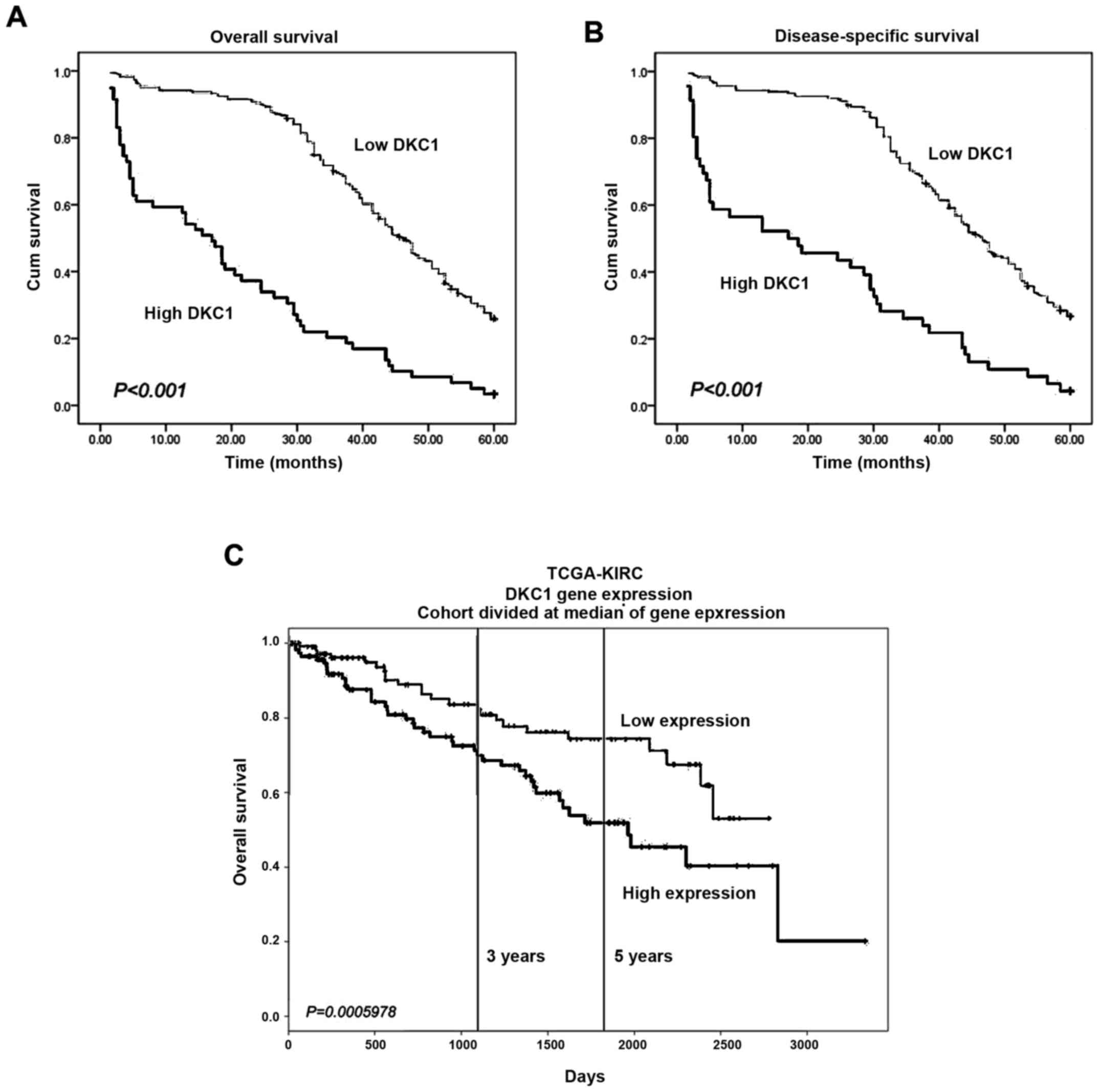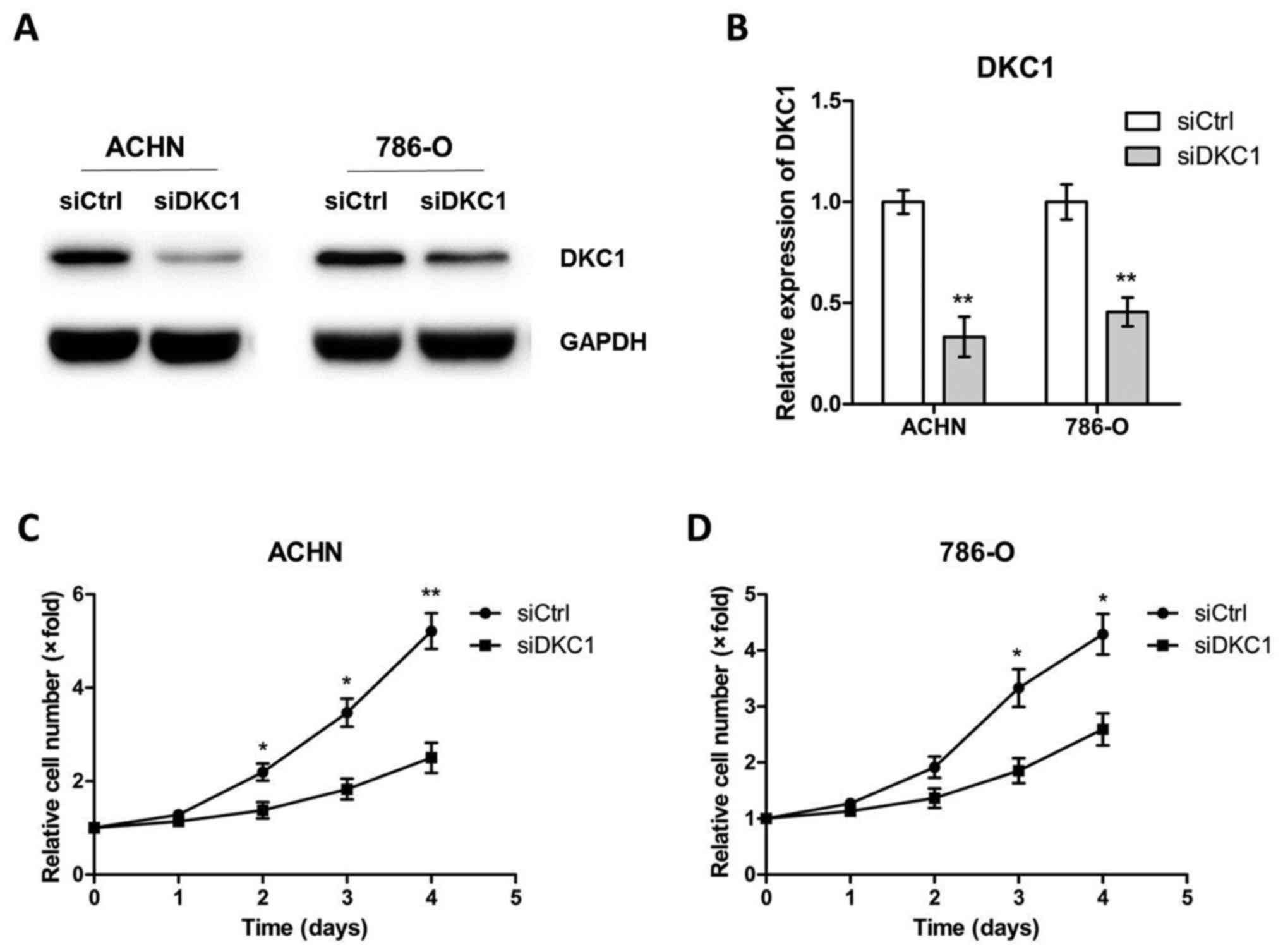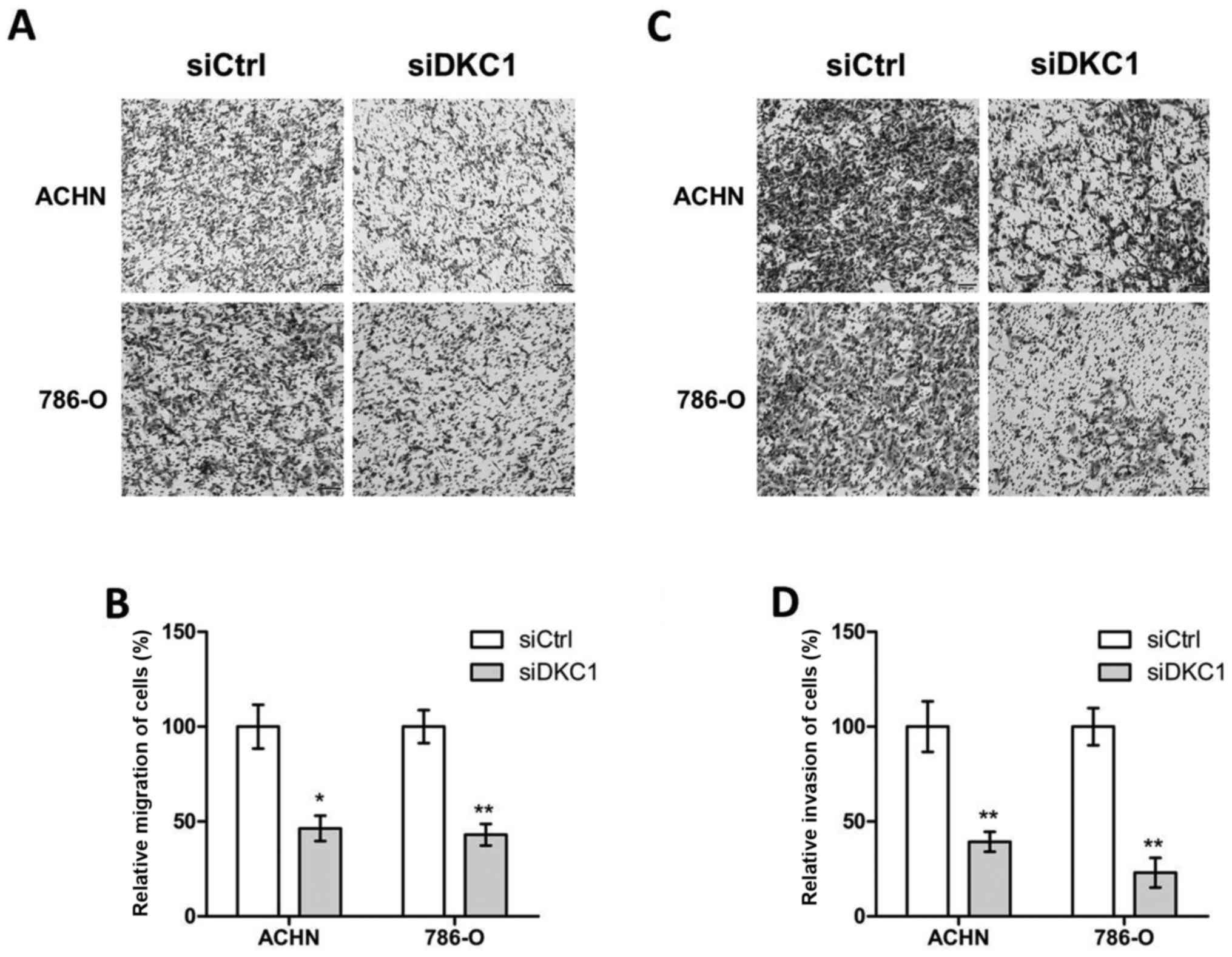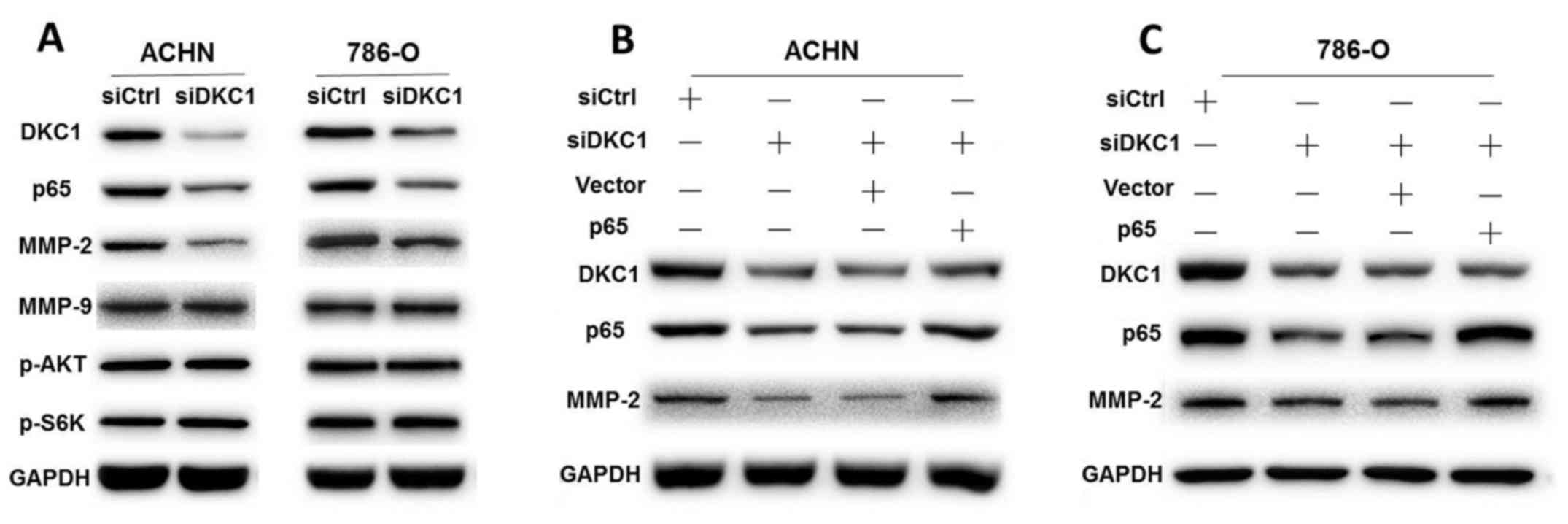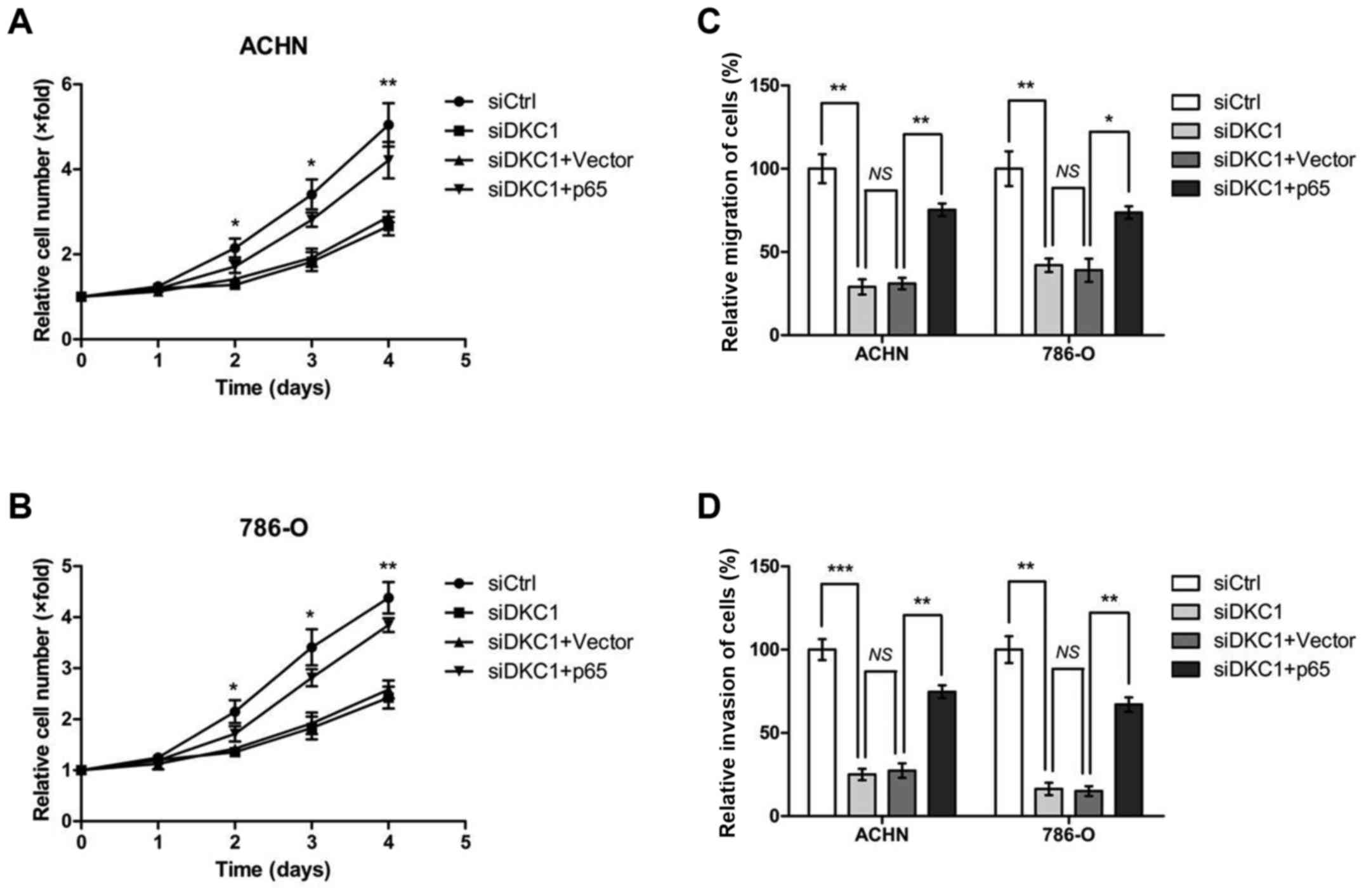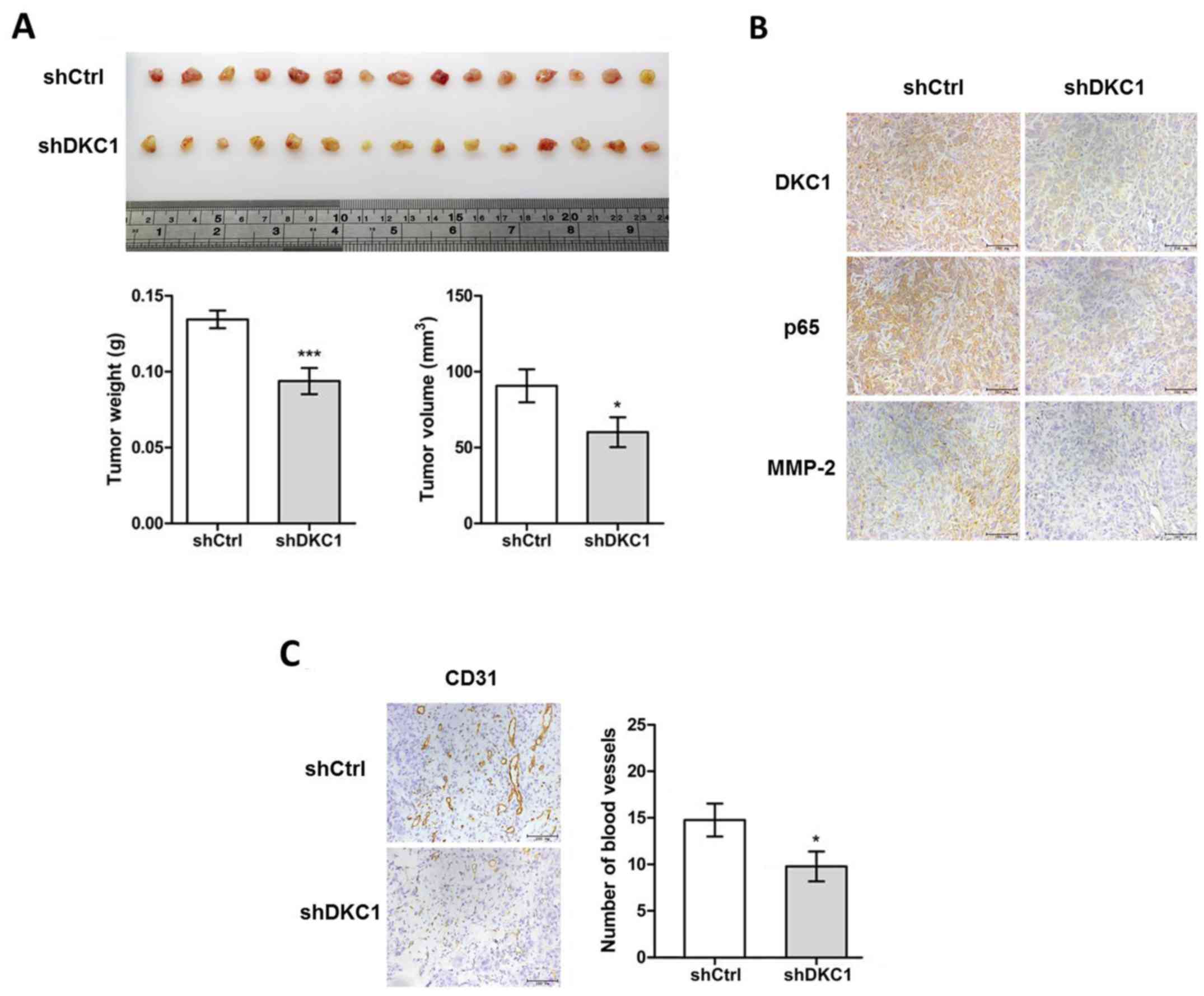|
1
|
Volpe A and Patard JJ: Prognostic factors
in renal cell carcinoma. World J Urol. 28:319–327. 2010. View Article : Google Scholar : PubMed/NCBI
|
|
2
|
Rini BI, Campbell SC and Escudier B: Renal
cell carcinoma. Lancet. 373:1119–1132. 2009. View Article : Google Scholar : PubMed/NCBI
|
|
3
|
Lu X, Gu W, Zhang H, Zhu Y, Shi G and Ye
D: Oligometastatic state predicts a favorable outcome for renal
cell carcinoma patients with bone metastasis under the treatment of
sunitinib. Oncotarget. 7:26879–26887. 2016.PubMed/NCBI
|
|
4
|
Singer EA, Gupta GN and Srinivasan R:
Update on targeted therapies for clear cell renal cell carcinoma.
Curr Opin Oncol. 23:283–289. 2011. View Article : Google Scholar : PubMed/NCBI
|
|
5
|
Heiss NS, Knight SW, Vulliamy TJ, Klauck
SM, Wiemann S, Mason PJ, Poustka A and Dokal I: X-linked
dyskeratosis congenita is caused by mutations in a highly conserved
gene with putative nucleolar functions. Nat Genet. 19:32–38. 1998.
View Article : Google Scholar : PubMed/NCBI
|
|
6
|
Kirwan M and Dokal I: Dyskeratosis
congenita: A genetic disorder of many faces. Clin Genet.
73:103–112. 2008. View Article : Google Scholar : PubMed/NCBI
|
|
7
|
Sieron P, Hader C, Hatina J, Engers R,
Wlazlinski A, Müller M and Schulz WA: DKC1 overexpression
associated with prostate cancer progression. Br J Cancer.
101:1410–1416. 2009. View Article : Google Scholar : PubMed/NCBI
|
|
8
|
O'Brien R, Tran SL, Maritz MF, Liu B, Kong
CF, Purgato S, Yang C, Murray J, Russell AJ, Flemming CL, et al:
MYC-Driven neuroblastomas are addicted to a telomerase-independent
function of dyskerin. Cancer Res. 76:3604–3617. 2016. View Article : Google Scholar : PubMed/NCBI
|
|
9
|
Liu B, Zhang JL, Huang C and Liu H:
Dyskerin overexpression in human hepatocellular carcinoma is
associated with advanced clinical stage and poor patient prognosis.
PloS one. 7:e431472012. View Article : Google Scholar : PubMed/NCBI
|
|
10
|
Bellodi C, Krasnykh O, Haynes N,
Theodoropoulou M, Peng G, Montanaro L and Ruggero D: Loss of
function of the tumor suppressor DKC1 perturbs p27 translation
control and contributes to pituitary tumorigenesis. Cancer Res.
70:6026–6035. 2010. View Article : Google Scholar : PubMed/NCBI
|
|
11
|
Montanaro L, Calienni M, Bertoni S, Rocchi
L, Sansone P, Storci G, Santini D, Ceccarelli C, Taffurelli M,
Carnicelli D, et al: Novel dyskerin-mediated mechanism of p53
inactivation through defective mRNA translation. Cancer Res.
70:4767–4777. 2010. View Article : Google Scholar : PubMed/NCBI
|
|
12
|
Mei P, Bai J, Shi M, Liu Q, Li Z, Fan Y
and Zheng J: BRMS1 suppresses glioma progression by regulating
invasion, migration and adhesion of glioma cells. PloS One.
9:e985442014. View Article : Google Scholar : PubMed/NCBI
|
|
13
|
Bai J, Yong HM, Chen FF, Song WB, Li C,
Liu H and Zheng JN: RUNX3 is a prognostic marker and potential
therapeutic target in human breast cancer. J Cancer Res Clin Oncol.
139:1813–1823. 2013. View Article : Google Scholar : PubMed/NCBI
|
|
14
|
Bai J, Zhou Y, Chen G, Zeng J, Ding J, Tan
Y, Zhou J and Li G: Overexpression of Cullin1 is associated with
poor prognosis of patients with gastric cancer. Hum Pathol.
42:375–383. 2011. View Article : Google Scholar : PubMed/NCBI
|
|
15
|
Karin M: Nuclear factor-kappaB in cancer
development and progression. Nature. 441:431–436. 2006. View Article : Google Scholar : PubMed/NCBI
|
|
16
|
Takeshita H, Yoshizaki T, Miller WE, Sato
H, Furukawa M, Pagano JS and Raab-Traub N: Matrix metalloproteinase
9 expression is induced by Epstein-Barr virus latent membrane
protein 1 C-terminal activation regions 1 and 2. J Virol.
73:5548–5555. 1999.PubMed/NCBI
|
|
17
|
Cully M, You H, Levine AJ and Mak TW:
Beyond PTEN mutations: The PI3K pathway as an integrator of
multiple inputs during tumorigenesis. Nat Rev Cancer. 6:184–192.
2006. View
Article : Google Scholar : PubMed/NCBI
|
|
18
|
Huang S, Robinson JB, Deguzman A, Bucana
CD and Fidler IJ: Blockade of nuclear factor-kappaB signaling
inhibits angiogenesis and tumorigenicity of human ovarian cancer
cells by suppressing expression of vascular endothelial growth
factor and interleukin 8. Cancer Res. 60:5334–5339. 2000.PubMed/NCBI
|
|
19
|
Audenet F, Yates DR, Cancel-Tassin G,
Cussenot O and Roupret M: Genetic pathways involved in
carcinogenesis of clear cell renal cell carcinoma: Genomics towards
personalized medicine. BJU Int. 109:1864–1870. 2012. View Article : Google Scholar : PubMed/NCBI
|
|
20
|
Mochizuki Y, He J, Kulkarni S, Bessler M
and Mason PJ: Mouse dyskerin mutations affect accumulation of
telomerase RNA and small nucleolar RNA, telomerase activity, and
ribosomal RNA processing. Proc Natl Acad Sci USA. 101:10756–10761.
2004. View Article : Google Scholar : PubMed/NCBI
|
|
21
|
Filipowicz W and Pogacic V: Biogenesis of
small nucleolar ribonucleoproteins. Curr Opin Cell Boil.
14:319–327. 2002. View Article : Google Scholar
|
|
22
|
Westermann F, Henrich KO, Wei JS, Lutz W,
Fischer M, König R, Wiedemeyer R, Ehemann V, Brors B, Ernestus K,
et al: High Skp2 expression characterizes high-risk neuroblastomas
independent of MYCN status. Clin Cancer Res. 13:4695–4703. 2007.
View Article : Google Scholar : PubMed/NCBI
|
|
23
|
Schaner ME, Ross DT, Ciaravino G, Sorlie
T, Troyanskaya O, Diehn M, Wang YC, Duran GE, Sikic TL, Caldeira S,
et al: Gene expression patterns in ovarian carcinomas. Mol Boil
Cell. 14:4376–4386. 2003. View Article : Google Scholar
|
|
24
|
Poncet D, Belleville A, t'kint de
Roodenbeke C, Roborel de Climens A, Ben Simon E, Merle-Beral H,
Callet-Bauchu E, Salles G, Sabatier L, Delic J and Gilson E:
Changes in the expression of telomere maintenance genes suggest
global telomere dysfunction in B-chronic lymphocytic leukemia.
Blood. 111:2388–2391. 2008. View Article : Google Scholar : PubMed/NCBI
|
|
25
|
Lowe SW: Cancer therapy and p53. Curr Opin
Oncol. 7:547–553. 1995. View Article : Google Scholar : PubMed/NCBI
|
|
26
|
Lowe SW, Bodis S, McClatchey A, Remington
L, Ruley HE, Fisher DE, Housman DE and Jacks T: p53 status and the
efficacy of cancer therapy in vivo. Science. 266:807–810. 1994.
View Article : Google Scholar : PubMed/NCBI
|
|
27
|
Tomasino RM, Morello V, Tralongo V, Nagar
C, Nuara R, Daniele E, Curti M and Orestano F: p53 expression in
human renal cell carcinoma: An immunohistochemical study and a
literature outline of the cytogenetic characterization.
Pathologica. 86:227–233. 1994.PubMed/NCBI
|
|
28
|
von Stedingk K, Koster J, Piqueras M,
Noguera R, Navarro S, Påhlman S, Versteeg R, Ora I, Gisselsson D,
Lindgren D and Axelson H: snoRNPs regulate telomerase activity in
neuroblastoma and are associated with poor prognosis. Transl Oncol.
6:447–457. 2013. View Article : Google Scholar : PubMed/NCBI
|
|
29
|
Montanaro L, Brigotti M, Clohessy J,
Barbieri S, Ceccarelli C, Santini D, Taffurelli M, Calienni M,
Teruya-Feldstein J, Trerè D, et al: Dyskerin expression influences
the level of ribosomal RNA pseudo-uridylation and telomerase RNA
component in human breast cancer. J Pathol. 210:10–18. 2006.
View Article : Google Scholar : PubMed/NCBI
|
|
30
|
Hanahan D and Weinberg RA: The hallmarks
of cancer. Cell. 100:57–70. 2000. View Article : Google Scholar : PubMed/NCBI
|
|
31
|
Karin M, Cao Y, Greten FR and Li ZW:
NF-kappaB in cancer: From innocent bystander to major culprit. Nat
Rev Cancer. 2:301–310. 2002. View
Article : Google Scholar : PubMed/NCBI
|
|
32
|
Uhlik M, Good L, Xiao G, Harhaj EW, Zandi
E, Karin M and Sun SC: NF-kappaB-inducing kinase and IkappaB kinase
participate in human T-cell leukemia virus I Tax-mediated NF-kappaB
activation. J Biol Chem. 273:21132–21136. 1998. View Article : Google Scholar : PubMed/NCBI
|
|
33
|
Kumar A, Takada Y, Boriek AM and Aggarwal
BB: Nuclear factor-kappaB: Its role in health and disease. J Mol
Med (Berl). 82:434–448. 2004. View Article : Google Scholar : PubMed/NCBI
|
|
34
|
Kim A, Kim MJ, Yang Y, Kim JW, Yeom YI and
Lim JS: Suppression of NF-kappaB activity by NDRG2 expression
attenuates the invasive potential of highly malignant tumor cells.
Carcinogenesis. 30:927–936. 2009. View Article : Google Scholar : PubMed/NCBI
|
|
35
|
Kessenbrock K, Plaks V and Werb Z: Matrix
metalloproteinases: Regulators of the tumor microenvironment. Cell.
141:52–67. 2010. View Article : Google Scholar : PubMed/NCBI
|
|
36
|
Alawi F and Lee MN: DKC1 is a direct and
conserved transcriptional target of c-MYC. Biochem Biophys Res
Commun. 362:893–898. 2007. View Article : Google Scholar : PubMed/NCBI
|















